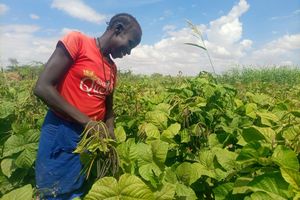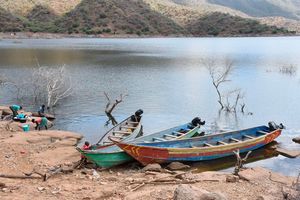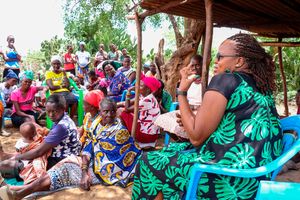
A man from the Turkana community takes a break under a tree while seated on a pile of firewood at a local rural school at Sopel village near the administrative capital, Lodwar town in Turkana county on September 27, 2022.
The effects of prolonged drought and sustained attacks in villages along the border of Turkana and West Pokot counties are evident as one crisscrosses Katilu and Kaputir wards in Turkana South Constituency.
From withered vegetation, and migrating pastoralists in search of pasture for their livestock or safety after raids to less populated villages where elderly locals, children, and women are abandoned.
Many youths who completed their secondary education and middle-aged locals considered it fit to migrate to major towns such as Lokichar, Lodwar, and Kakuma in search of better-paying jobs, opportunities to study, or start a new life away from banditry leaving the land to their parents and grandparents.
In Loodot village in Turkana South sub-county, however, elderly residents have resisted the urge to migrate from their ancestral land despite their frequent bandit attacks in the area taken up the challenge to make lemonade out of the lemon.
The elderly locals in Loodot village are enhancing resilience in an area faced with prolonged drought through small-scale farming, cultivating nutritious vegetables and fruits to survive. They say pastoralism is no longer reliable as they are too weak to migrate in search of pasture.
The Nation caught with one of them- Daniel Loteng'an who is in his 60s. Despite the scorching sun on a hot Wednesday afternoon, he is busy on his one-acre farm where he has planted a variety of vegetables and fruit trees that include, cowpeas (kunde), black nightshade (managu), collard greens (sukuma) and pawpaw.
"I don't have any other source of livelihood. I used to own a large number of livestock but were all taken away in 2008 while grazing here. This used to be our grazing field during drought season because it is near River Turkwel hence an easy target. Efforts to restock were unfruitful as prolonged drought killed them," Mr Loteng'an told the Nation as he picked a mature pumpkin.
"Whenever there was insecurity, I would join other villagers to migrate to villages we thought were secure and wait until the government assured us of security for us to return," he added.
But as some of them grew older they realized that migrating to other villages was making them more vulnerable as they only relied on relief food.
Also read: Rural women, a nation’s powerful force
"Devolution through the county department of agriculture introduced farming for us as victims of banditry living along the river and we embraced it. We were trained and supplied with seeds and farm equipment after being trained by agricultural extension officers," Mr Loteng'an recalled.
He said that farms where most beneficiaries were youth had already been abandoned and were not attracting development partners to expand acreage or boost crop production.
Mr Loteng'an not only practices farming but also champions crop farming by practically training his grandchildren and school-going children from the village during school holidays and at the weekends. He said that farming has an image problem in the villages with many young people regarding it as badly paid work for unskilled and old people.
"Pastoralism has been disrupted by banditry and climate change. It is high time elderly farmers transfer knowledge on farming to the young generation so that they can fully embrace it as an alternative and sustainable source of livelihood for villages along River Turkwel. Most of us don't have livestock that attracts bandits so we must embrace farming to survive," he said.
Mr Hussein Noor, Nawiri’s Chief of Party said the commitment and dedication of Mr Loteng'an and 282 other farmers at the Loodot village most of whom are elderly people is a testament that if locals who were once pastoralists embrace farming and are fully supported, it will tackle food insecurity.
"We are fast-tracking water infrastructure rehabilitation to enhance crop production as some farms are not well served with water from the Turkwel River. We are working on a functional piping system on the farm as well as erecting a 100,000-liter steel tank to store water," Mr Noor said.
In Turkana Central and Loima constituencies, Germany's Relief Coalition (Aktion Deutschland Hilft, ADH) is through Helpage International Kenya in partnership with Echami Aito, a community-based organization of women professionals in Turkana also improving the quality of life and well-being of older people in Turkana through climate smart agriculture.
At the Nanyee irrigation scheme in Loima Sub County, Ms Jane Emekwi, 63 is cultivating sorghum, cowpeas, green grams, collard green, tomatoes, bell peppers, and maize through climate-smart agriculture.
"I practice intercropping, crop rotation, and integrated crop-livestock management together with my elderly husband," Ms Emekwi said.
She says that if they would not have embraced farming, her husbands would have migrated more than 50 kilometers with their peers in search of pasture for their livestock.
Echami Aito Chairlady Alice Cheshir said that the project targets 200 people aged 60 years and above with a few youths to support the older persons with climate-smart agriculture knowledge as well as seeds for groundnuts and orange-fleshed sweet potatoes to boost nutrition and provide them with a source of income.
The older women are benefiting from certified seeds as we provide few youth with an opportunity to learn from them farming skills," Ms Chesir said.
The project also targets to deliver a fully equipped high-yielding borehole to catalyse agricultural production at Choro Farm through irrigation with women encouraged to establish kitchen gardens and plant fruit trees.
Climate Change Expert Chris Aletia said that efforts to lure youth to venture into farming activities have always been in vain but with limited formal job opportunities in major towns, authorities should change tact and establish grants for agribusiness.
"There is a need to popularize agriculture as an opportunity for job creation for our youth. They only need to individually or in groups apply for available grants, trained on better agricultural practices, and produce vegetables and fruits for ready markets in major towns," Mr Aletia said.










